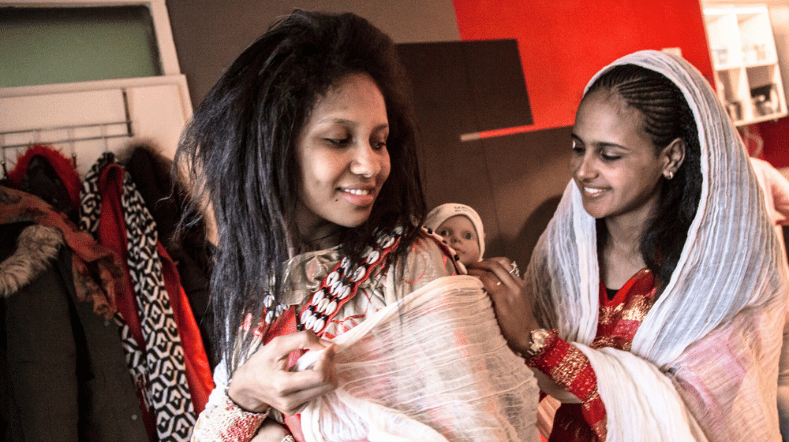
A child's first 1,000 days
A child's first 1,000 days, from preconception to age two, are crucial for development, health, and well-being. By giving parents the right advice as early as possible and by intervening quickly when problems start, we prevent the need for more intensive care later on.
Additional efforts during the period from conception to the second year of a child's life are, on average, 7 to 10 per cent more effective than interventions after that period. That's why we develop new interventions to reach parents as early as possible, preferably before pregnancy. We develop these interventions in consultation with healthcare professionals, policymakers, parents, and children, and we test them for usability and effectiveness.
Preconception counselling
Preconception care can prevent premature births, birth defects, low birth weight, and low Apgar scores. For example, it's best for women to stop smoking and drinking before pregnancy. A visit to the family doctor to discuss family predisposition is also advisable. Preconception counselling makes future parents aware of this.
It's proving very difficult to get this message across to women and men. That's why we created different approaches, such as a website and teaching materials for senior secondary vocational students. In a new project, we use CenteringPregnancy and CenteringParenting to offer integrated care and the community and social network strategy to reach pregnant women and young parents.
Lesson programme ‘Pregnant or not’
An example of a preconception counselling initiative is the educational programme ‘Pregnant or not’ [Nietofwelzwanger]. This programme for senior secondary vocational students is about preventing pregnancy (STIs and contraception), teenage parenthood, and what students themselves can do to start a pregnancy as healthily as possible in the future.
The programme consists of a curriculum and a website. The curriculum is based on the Centering methodology, which focuses on group discussion and interaction. On the website, students find tailored information with a quiz, videos, and personal experiences. The information focuses on preventing pregnancy, what’s involved in pregnancy, and what you can do to promote a healthy pregnancy. ‘Pregnant or not’ was developed by TNO Child Health and KNOV.
CenteringPregnancy and CenteringParenting
CenteringPregnancy and CenteringParenting are new forms of care, in which parents and future parents receive guidance in groups, with room for more than just the standard medical check-up. There's also room for active participation in care and discussions about lifestyle choices, preparation for parenthood, nutrition, sleep problems, vaccination, and all topics that concern parents and prospective parents.
In Centering, there's time for open discussions in the group. Participants can ask many questions and parents and prospective parents support and learn from each other. This allows them to make more informed choices. During the first 1,000 days, healthcare providers are not only informing professionals but also supporting partners by creating the conditions for a supportive network within and outside professional care.
CenteringPregnancy and CenteringParenting are available as standard care in several places. Parents can choose between individual counselling or group participation. We study the effectiveness and the methodology and develop them further for specific subjects and specific target groups.
Early intervention
The ALPHA-NL is an early detection tool for midwives. This allows obstetric care providers and clients to work together to find out if there's a need for help or support during the pregnancy. The pregnant completes a short questionnaire prior to a consultation. The questions concern psychosocial themes such as relationships, support from the environment, use of stimulants, her own childhood, and psychological well-being. During the consultation, this is discussed in an accessible manner. The midwife can refer the woman or suggest prenatal home visits by Youth Health Care.
ALPHA-NL is a science-based and valid tool for discussing psychosocial topics. The ALPHA-NL is accompanied by a short half-day training course, and we recommend making agreements about care pathways and referrals within the Obstetric Cooperation Association and the Youth Health Care.
You can also follow an e-learning in which you learn how to apply the ALPHA-NL as an obstetric care provider. Within this accredited e-learning, the ALPHA-NL is available for download.
D-score
Worldwide, especially in developing countries, many young children are disadvantaged in their early years by lack of proper nutrition, educational care, and learning opportunities. To identify the problem, we developed a special screening to measure the Development Score (D-score) of young children.
The screening method measures physical, emotional, and communication skills. The D-score is based on the Van Wiechen characteristics. These are milestones that Dutch youth health care already uses. We apply this knowledge in a large-scale, international collaboration to measure the development of young children in the same way all over the world.
Practical collaboration
Within all the topics described above, we connect knowledge with practice. We work with healthcare professionals, policymakers, schools, and parents. We look for connection throughout the line of care, so that every child gets the care they need.
All opportunities for all children
If you are interested in our work and its results in relation to the healthy and safe development of children and young people, download the e-brochure ‘All opportunities for children’. Read, watch, and listen to the stories of our projects, which are committed to giving all children every opportunity to grow up healthy and safe.
Want to know more?
- Download the report ‘Exploration of Youth Health Care indicators’ (Verkenning JGZ indicatoren) (pdf) (pdf)
- Read ‘10 design elements for (online) information and support during breastfeeding’ (10 ontwerpelementen voor (online) informatie over en ondersteuning bij borstvoeding) (pdf)
- Download the position paper ‘A healthy, promising, and safe new generation’ (Een gezonde, kansrijke en veilige nieuwe generatie) (pdf)
Get inspired
Group Care during the first 1000 days makes a difference around the world


Personalised prevention and health


Eight things to know about the D-score


D-score in practice: simplifying the complexity of a childs development


I-JGZ





